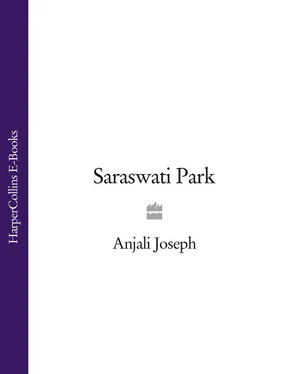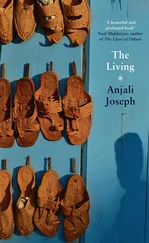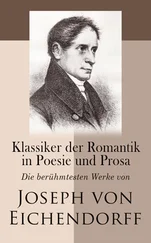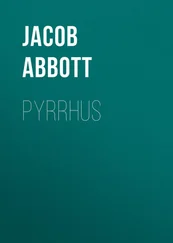Now he stood inside the grand station, which was light, quiet, and almost cold at this hour. Pigeons fluttered in the sulight, high above the vaulted ceiling. A few red-coated porters passed at a brisk little jog; a long-distance train must have been arriving. Mohan had gone to buy a ticket for Ashish. He came back, put a hand on the boy’s thin shoulder and slipped the two-inch rectangle of yellow pasteboard into his shirt pocket. ‘Come, that’s our train. Can you run?’
They began an awkward trot. The elder man ran easily, despite the aged VIP suitcase he carried, and the boy skipped lopsidedly behind him, trying not to spill the contents of the carton, which slithered, skittish, and threatened to make a leap for freedom.
The wide platform was clear; the horn sounded; at the same magical moment the train began to pull out. Mohan heaved in the suitcase, jumped on, cried, ‘Here!’ He took the carton from Ashish and pulled him on by the wrist.
The heavy train was already moving fast. It drew away from the station and into the warm, bright sunlight just outside. Ashish looked down: this was the place where the tracks intersected, then separated again.
Saraswati Park was settling into its Sunday. A few people were outside the vegetable shop; a woman negotiated with a man who stood behind a handcart covered with large, green-striped watermelons; the rickshaw turned into the lane.
‘Take a right – up a bit – no, stop. Yes, here.’ Mohan dragged the suitcase out and paid the rickshaw driver, who stared unabashedly at the four-storey building. Its yellow paint was peeling. The name Jyoti was stencilled in dark red letters on the gatepost. Ashish staggered out of the other side of the rickshaw, still clasping the carton, and followed his uncle into the small entrance with its wall of pierced tiles. He had come here regularly as a child, but not recently; the last occasion he recalled was his cousin Gautam’s wedding three or four years earlier. Now everything came back to him: the names on the plate at the foot of the stairs (Gogate, Kulkarni, Gogate, Gogate, Prabhu, Kamat, Karekar, Dasgupta) and the double doors – the inner ones were open and the outer doors had a large ornamental grille from which Sunday cooking smells came into the stairwell. Withered garlands of auspicious leaves hung from the lintels, and, outside several of the apartments, pairs of sinister looking red footprints marked the time, years before, when the lady of the house had arrived as a new bride.
When they reached the third floor, panting, Mohan put his hand into the grille of number 15 and opened the catch. He turned to beam at his nephew. ‘Come,’ he said.
Lakshmi appeared, in her post-bath outfit of clean salwar kameez, her hair still loose. ‘Wait!’ she said dramatically to Ashish, who paused at the door, taken aback. She held a comb in one hand and raised it like a ceremonial item. The scent of her hair oil, amla, floated to him. ‘Now,’ she said, ‘with the right foot.’
Ashish grinned foolishly and rebalanced himself. He stepped over the ledge, right foot first, and his aunt smiled and closed the outer door behind him.
‘You never made me do that before,’ he mumbled.
‘But then you were only visiting,’ she said.
Mohan had melted into the passage with the suitcase; he now reappeared. ‘Come,’ he said. Still holding the carton, Ashish followed him. The peculiar smell of the dark corridor returned vividly: a mysterious amalgam of old calendars, dust, and superannuated cockroach repellent sachets, with their intriguing round perforations. The room at the end had been Gautam and Ashok’s. Ashish strode towards it with a new-found audacity, Gulliver in Lilliput. A collection of his cousins’ comics was neatly piled on the lower shelf of the bookcase; a cricket bat, badly cracked, leaned against the desk.
His aunt opened the steel cupboard proudly. ‘Look,’ she said. ‘I cleared it out for you.’ The cupboard seemed to have shrunk; the stickers welded to the mirror in the door were now at Ashish’s eye level. One showed the West Indian batsman Viv Richards making his famous on-drive; the other was a logo of a red fist, thumb pointed perkily upwards. Behind them, his reflection wavered: knife-thin, suspicious looking. He tried to smile at himself. The effect wasn’t reassuring.
Mohan patted him on the shoulder. ‘Come on,’ he said. ‘Take off your shoes, wash your hands and have some breakfast.’
They left Ashish in the room, the door open, and he sat on the bed and untied his shoelaces. The cold floor felt smooth and clean under his feet. He looked around the room, so familiar and yet new.
From the kitchen, he heard the rumble of his uncle’s voice.
After lunch his aunt and uncle disappeared into their room where, with the door open, they lay on the bed, immobile. His aunt slept curled to one side; his uncle lay like an Egyptian embalmed under a sheet. The fan, on a high setting, made the pages of the book on Mohan’s chest flutter.
Ashish fidgeted, and fiddled with his mobile telephone. He pressed, repeatedly, the key that cleared the display: each time it illuminated anew, a bright green. There was no message from Sunder. What was he doing at this moment? Ashish imagined him eating lunch in a hotel coffee shop, or playing a computer game; watching a movie on an enormous flat-screen television. It was possible that Sunder was bored too, but even his boredom was exotic: it would take place in a vast, air-conditioned flat.
Ashish wandered, examining the well-known apartment with a detective’s eye. The flat had its own, specific virtues that he couldn’t imagine Sunder appreciating: the cane chair with a high back, where his uncle liked to sit and read in the evening, in the bright circle of light emitted by a hundred-watt bulb; the woven rope footstools, which had a piece of old tyre at their base; the reading table piled with books and papers; the bookshelves. There were Marathi novels and short stories, pirated thrillers from the pavement, translations of Sherlock Holmes into Marathi (the action had been transposed to Bombay), P.G. Wodehouse, Agatha Christie, Charlotte Brontë, George Eliot, Nancy Drew, Henry James, and, on the bottom shelf, behind the cane chair, a few more esoteric titles. He pushed the chair aside and squatted to look at them. The shelves here smelled pleasantly musty, of an organic, reechy dust. He pulled out a volume with a yellow spine: I’m OK, You’re OK . Another, with a black cover: The Silva Method . A third, battered-looking, with only a few vestiges remaining of the original red jacket: Become a Writer . He carried them off to his room; they’d help to pass the afternoon.
He woke up later, drooling on his arm. His feet were cold. Why was it so quiet? Then he realized: the noises of water pipes gurgling, of feet running up and down the corroded cast-iron stairs, and the whole building rattling around him every time a bus or truck passed on the road outside; these had been left in Esplanade Mansion. Here there was only the sound of birds chirping, implausibly cheerfully. He sat up and examined the phone. Still no message. Was it because of what had happened on Wednesday? The servant, coming into the room with glasses of cold lemonade on a tray, had given them a funny look. But they hadn’t been doing anything, just lying on the bed and reading the same book. When Ashish hadn’t seen Sunder in college for three days he’d called him, but there had been no answer. He ached to know what had happened, what would happen; during the last year, their friendship, so odd and circumstantial, had been hesitating on the edge of something else – but he couldn’t be certain. Surely it wasn’t all in his imagination?
There was a shout from outside. He wiped his mouth and went to the window. Boys were playing cricket in the lane. A small child ran up to bowl a tennis ball at a much older boy, who whooped and hit it hard; the ball landed, making a joyous thump, on the bonnet of a car halfway down the lane and the watchman got up and began to walk, with the detached enjoyment of someone playing a well-known role, towards the cricketers.
Читать дальше












